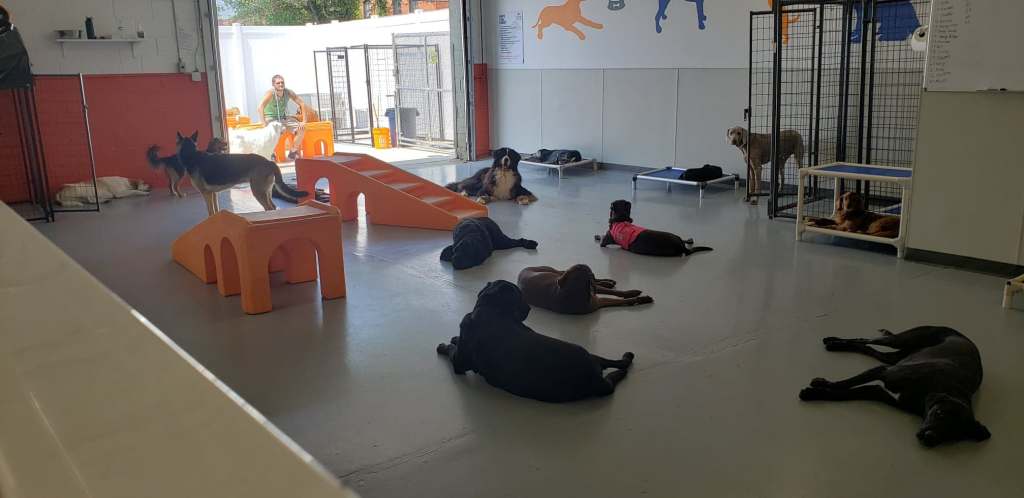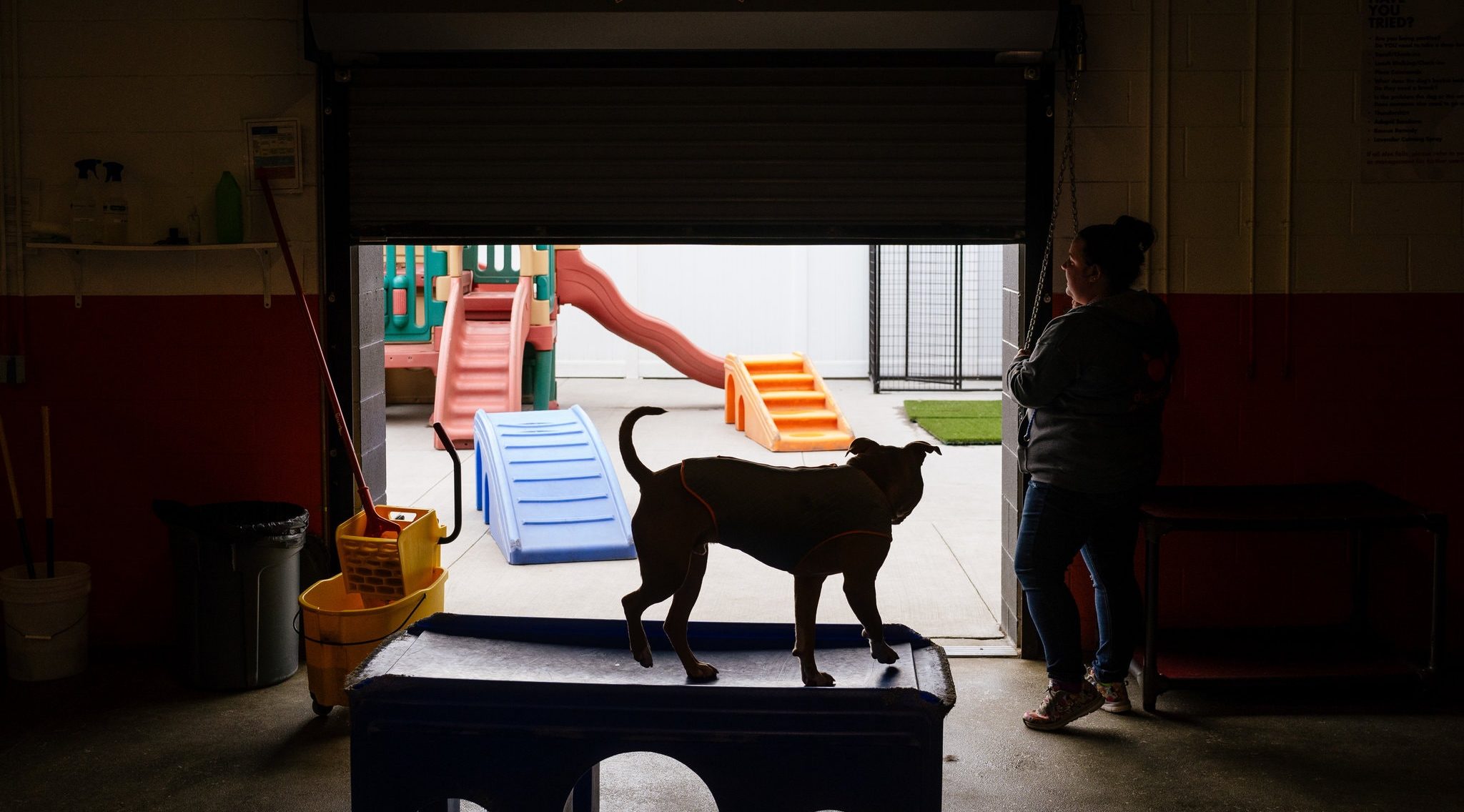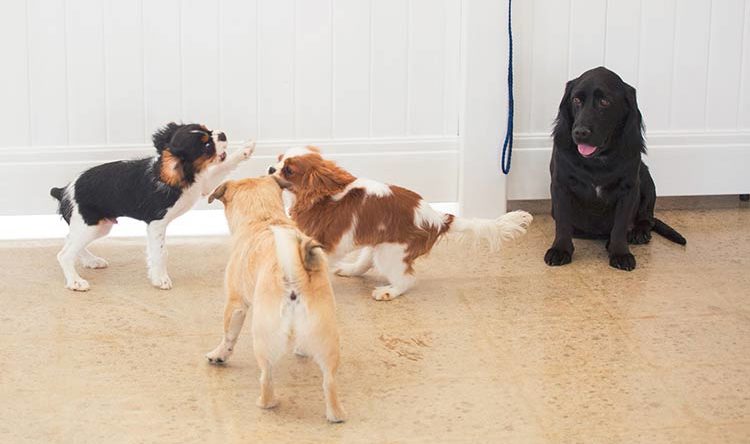“What I’ve Learned about Kennel Cough after Owning a Doggie Daycare”

Canine Cough. It’s the bane of my industry’s existence. We tried to change the name from “kennel cough” to “Canine Cough” so people would not “blame it on the kennel,” but we all know that the main place dogs will pick this virus up is around other dogs – like at doggie daycares and kennels.
For many, many years, I beat myself up every time we had even one case of Canine Cough. I worried that it meant that we were not cleaning enough, using the right cleaning products, or strict enough about vaccines. I swore if we tried hard enough, we’d be able to prevent it altogether. So we made changes, and still, the cough continued to rear its ugly head multiple times a year, particularly during the busier seasons. You know – when people really want to board their dogs.
So then we tried education – “This is what Canine Cough is. This is how your dog gets it. This is what it sounds like. It is extremely common for dogs that are regularly in a social setting with other dogs, even with the best of cleaning and prevention protocols. Please do not bring your dog in if they have any symptoms” and that educated people to some extent. But similar to COVID or other respiratory infections, this can be asymptomatic and we will not know if a dog is carrying it until it has already spread.
Sadly, many pet parents still don’t know what to look for. When we see signs of symptoms of any sort, we always immediately remove the dog from group and call the owner to make them aware so they can come pick up their dog. We often hear things like “oh, I noticed he was making that noise over the weekend” or “I saw his drippy nose, but I thought it was no big deal.”
Another thing we have to battle is the understandable confusion about the Canine Cough vaccine; AKA the Bordetella vaccine. I will let the professionals explain this better than I can in depth, but TL;DR, there are a bunch of other viruses or bacteria that cause Upper Respiratory Infections in dogs, and this Bordetella vaccine only prevents some of them. So we end up with frustrated and concerned owners of dogs who have gotten the vaccine but still get the sickness.
In 2018, when I was TOTALLY FREAKING OUT about the rapidly spreading cough, I called my vet/mentor/friend/client Dr. Graham and begged her to tell me what I could do, once and for all, to rid my business of the cough. And her response is really what got me to calm down about it. She told me – wait for it – TO STOP ALLOWING NOSE TO NOSE CONTACT – at my doggie daycare. Which we both know is the whole point of doggie daycare and group play boarding – for dogs to play and interact with each other.
She was basically telling me what every professional that I spoke to up until that point had, that, much like illnesses in daycare, even the best cleaning protocols could not prevent Canine Cough altogether. She also reminded me that it is one of the very minor and temporary risks of socializing with other dogs, whether at a dog park, daycare, or even with friends or family dogs. And I have begun to approach things differently ever since then.
Chances are, if you chose to take your dog to a dog park, daycare, or group play boarding facility, they are going to get some sort of communicable illness. Probably the cough, but things like puppy warts and giardia are also things that are seen in animals that have close contact with one another. Just like when people take their kid to school, they will probably get a cold, head lice, a stomach bug, or one of the many other germs that go around. And the younger the dog, the more likely that is, as they are still building up their immune system. As the world learned over the last year, viruses are terribly persistent, and this applies in the dog world even more. You can tell your kid to wear a mask and stand 6 feet away – you cannot tell your puppy not to lick inside his new friend’s mouth and slurp up his tasty drool when it gets on the floor. Puppies love to put things in their mouths and put their mouths on things – especially their friends! And, as my amazing dog trainer friend Katelin Thomas reminded me, in the end, the consequences of not socializing with other animals far outweighs the risk of getting something like Canine Cough.
It breaks our heart when people call us and tell us their dog is sick, or when we hear a new puppy friend is dealing with an upper respiratory infection. Even my own, almost 3 year old, Newfoundland has gotten it, as have some of the other Canine To Five Team members who bring their dogs to work. But, we now no longer beat ourselves up over it, feeling like we did something wrong. Instead, we constantly revisit and revise our protocols, we continue to be incredibly transparent, we have intense cleaning protocols and ensure every staff member is trained and hyper aware of the signs and symptoms. We have isolation areas and communication plans and focus daily on ensuring we are doing the best we can to keep every single dog in our building safe and healthy.
We are incredibly transparent about any signs of illness we see in our facilities. Internally, we track the number of cases we see each week and when it comes to client communication, we have developed a fine tuned process over the years to ensure no one is out of the loop.
- When we first receive reports of coughing, clients who have recently attended daycare or boarding are notified via email right away
- Signage is displayed in the lobby notifying all in-person guests that Canine Cough was reported in our facility
- The date of the last reported case is promptly displayed in our reservation confirmation emails, along with information on what Canine Cough is
- All new clients are informed before scheduling their first day evaluation, and new puppies are not permitted to begin until we go a week without a reported case
- All clients who report their dog is symptomatic receive a follow up email mandating their dog stay out of daycare until 10 days after the last cough
- If Canine to Five is still receiving reported cases after 7 days, a text message will be sent to recent clients letting them know it is still going around and to watch for symptoms
- After 10 days from the SMS, another email is sent in the event there are still reported cases
- This process will repeat, rotating every 7 – 10 days until our facility goes 14 days without a report case
- Once 14 days without a reported case, the message is removed from the confirmation emails
This process gives every pet owner the opportunity to cancel if they are concerned, it prevents us from furthering the spread by postponing our first day evaluations, and it helps keep everyone informed on symptoms in the event they begin to see them from their own dogs.

My team and I have accepted the fact that we will see communicable disease go around our dog population from time to time, and the very best we can do is educate, inform, stay strict on our cleaning and vaccine protocols and over-communicate to both new and current clients. Safety of the dogs in our care is, and always will remain my top priority.
As always, I am happy to talk our concerned clients about this,
Liz Blondy, Owner of Canine to Five
liz@caninetofive.com


